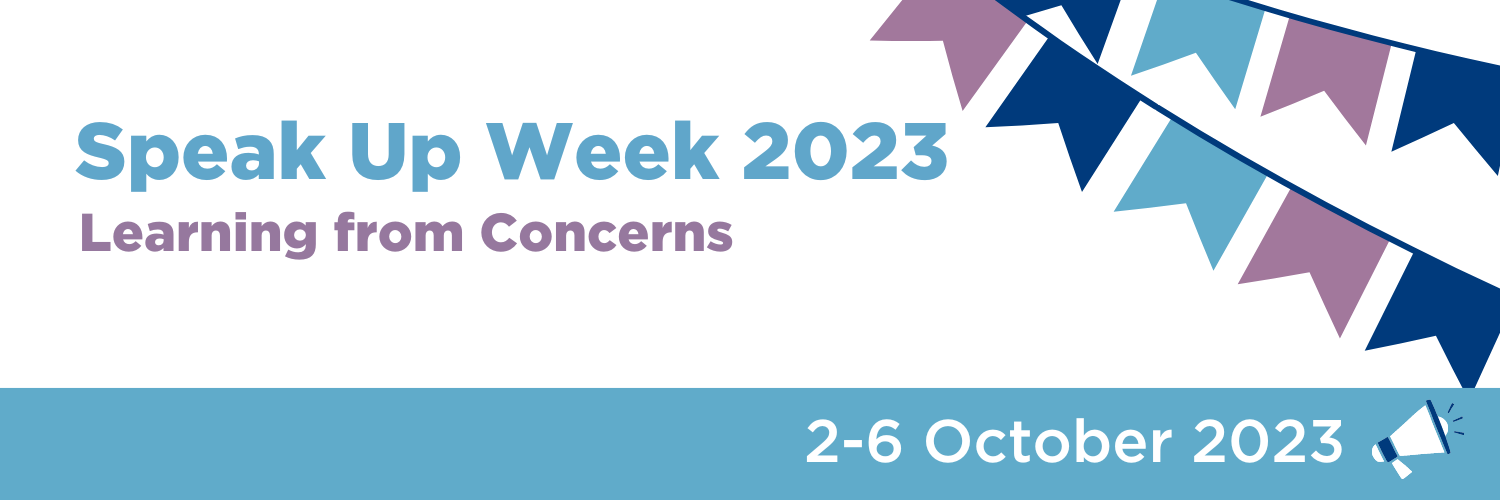
Welcome to Speak Up Week 2023!
The theme of the week for 2023 was 'Learning from Concerns'. Every day we shared content around a particular topic:
- Monday: Encouraging a speak up culture
- Tuesday: Sharing learning whilst maintaining confidentiality
- Wednesday: Recording outcomes & learning
- Thursday: Sharing improvements and action plans with the whistleblower
- Friday: Reporting on learning & improvements
Under each drop down below you'll find events, blogs and videos around the benefits of speaking up and how we can encourage a good speak up culture. You can also catch up on social media by visiting @SPSO_Ombudsman or searching under the hashtag #SpeakUpWeek.
We also want to hear from you! If you have any photos and videos of your own events and and want to share them with us, please email them to [email protected].
Live online panel discussion: Learning from concerns
The big event of the the week was a live panel discussion which took place on Thursday 5 October 2023. This covered:
- learning from concerns
- sharing improvements and action plans with the whistleblower
- what a good speak up culture looks like
Panel speakers included:
- the Whistleblowing Champion from NHS Fife
- a General Practitioner from the NHS Tayside area, and
- the Chief Executive of NHS Orkney.
Speak Up Week 2023: The week in review
NHS Scotland’s second Speak Up Week has been a great opportunity for health boards to highlight the benefits of speaking up. We’ve been delighted by the engagement we have seen from boards during the week on social media, and if you missed anything you can catch up on X (formerly Twitter) by searching for the hashtag #SpeakUpWeek.
The week started with a thoughtful conversation between Rosemary Agnew, the Independent National Whistleblowing Officer, and Tracey Gillies, Executive Medical Director at NHS Lothian. They reflected on the last two and a half years of INWO and the National Whistleblowing Standards, and discussed how boards can enable confidence in speaking up and how this is supported through the INWO process. They also considered the importance of confidentiality in building confidence to speak up, and the challenges of maintaining individual confidentiality while sharing learning openly and transparently.
Also on Monday, Mike from the INWO team presented a short video about how to encourage a speak up culture in NHS organisations.
On Tuesday, Edward from the INWO team told us about the challenges of sharing learning while maintaining confidentiality. We also posted a blog with some tips on how to do this.
On Wednesday, Fran from the INWO team shared her thoughts on recording outcomes and learning as a fundamental part of the whistleblowing process that goes a long way to enable wider learning.
On Thursday our panel session, chaired by Niki Maclean (SPSO Director), with Dr Scott Jamieson (a General Practitioner in the NHS Tayside area), Kirstie MacDonald (Whistleblowing Champion at NHS Fife) and Laura Skaife-Knight (Chief Executive of NHS Orkney) showed the importance of how leaders and managers listen to people, as well as the need for strong and visible leadership on whistleblowing from the top of all NHS organisations. Listening and acting on feedback is an everyday activity, not just for an annual Speak Up Week, and staff should have access to informal and formal options to speak up. It is important to close the loop on concerns quickly, to ease any distress for everyone involved and make changes quickly. There is a need, in particular in primary care, for clear and simple policies and procedures around whistleblowing which are backed up by training and support. The panel recognised that dealing with whistleblowing doesn’t always come naturally and that even the terminology, such as the word ‘whistleblowing’, can be alien and confusing – saying ‘speaking up’ is more accessible. It’s also important to acknowledge the courage of people speaking up and that, having done so, they deserve a timely and meaningful response, as well as ongoing dialogue around changes being made – people shouldn’t need to be tenacious to get a response. Are our leaders trained enough to have the skills to deal with difficult topics and even taboos in the NHS? Senior leaders need to be open and honest and show humility when they get things wrong. They also need to spend time understanding whistleblowing, looking at and learning from case studies to develop themselves and help upskill their staff. Capturing learning is vital, but that in itself is not enough – learning must be shared, while respecting the confidentiality of the individuals involved, and this includes celebrating successes. Speaking up cannot be seen in isolation; it is part of feedback and how it is dealt with is an indicator of an organisation’s culture.
Also on Thursday, Amy from the INWO team explained how best to share improvements and action plans with the whistleblower.
The week was rounded off with Elaine from the INWO team giving us six tips for reporting on learning and improvements, which was supplemented by a blog about annual reports.
What happens next?
Speak Up Week has reminded us of the importance of speaking up in the NHS for the benefit of patients and staff, and the need to ensure everyone can speak up in a culture that embraces and learns from it. But it can’t be about just one week, it’s something we all need to work on every day, to help make the NHS a better place for everyone. Senior leaders and people responsible for whistleblowing governance need to demonstrate that speaking up is welcomed and valued, and line managers need to be supported to make this happen. Talking about speaking up should continue throughout the year and should be a regular focus of communication with staff.
Thank you to everyone who has taken part in Speak Up Week 2023. We were encouraged by the response of NHS organisations, and we appreciate all the work that has been put into it. We would love to hear about what you did, please send your feedback to [email protected].
Friday 6 October - Reporting on learning and improvements
Friday 6 October - Reporting on learning and improvements

Reporting on learning and improvements
Elaine from the INWO team provides some top tips on how Boards can report on learning and improvements.
Blog: Why is reporting on learning and improvements important?
Here’s the official bit - reporting has been a requirement under the National Whistleblowing Standards (the Standards) for the NHS in Scotland since April 2021. The Standards require NHS boards to produce quarterly reports for internal governance, and to publish an annual report setting out performance in handling whistleblowing concerns.
A fundamental principle of the Standards and whistleblowing procedure is to identify and act on learning from the outcome of whistleblowing concerns, the aim being to improve NHS services.
So we know that we are required to report but there’s more to it than that. Reporting on learning and improvements will support your organisation’s speak up culture.
Who sees your organisations annual report?
The public, patients, staff, the INWO, other NHS boards. The reports should be well sign posted and accessible.
What will the annual report tell people about your organisation?
It should make it clear that your organisation has a speak up culture where people feel safe to raise concerns, that they are listened to and supported, and that action is taken to ensure that learning and improvements take place as a result.
Producing the annual report
Ensure that your organisation has structured systems for capturing and recording whistleblowing concerns, their outcomes, and any resulting action taken to resolve the concern.
Remember anonymisation. It is key that every effort is made during the preparation of the annual reports to ensure that the identities of those involved in whistleblowing concerns cannot be discerned from the information or context provided in the report.
Consider how you will effectively report against KPI 1, which requires a statement outlining learning, changes or improvements to services or procedures as a result of consideration of whistleblowing concern. These give real opportunities for demonstrating your organisation’s speak up culture.
Use available resources
We encourage you to use the INWO's Good practice guidance for annual whistleblowing reporting or contact the INWO team advice phone line on Freephone: 0800 008 6112 or [email protected].
Blog: The week in review
That brings us to the end of Speak Up Week 2023! Thank you for getting involved and encouraging a good speak up culture. In our final blog we take a look back at the week's highlights: Speak Up Week 2023: The week in review.
Thursday 5 October - Sharing improvements and action plans with the whistleblower
Thursday 5 October - Sharing improvements and action plans with the whistleblower
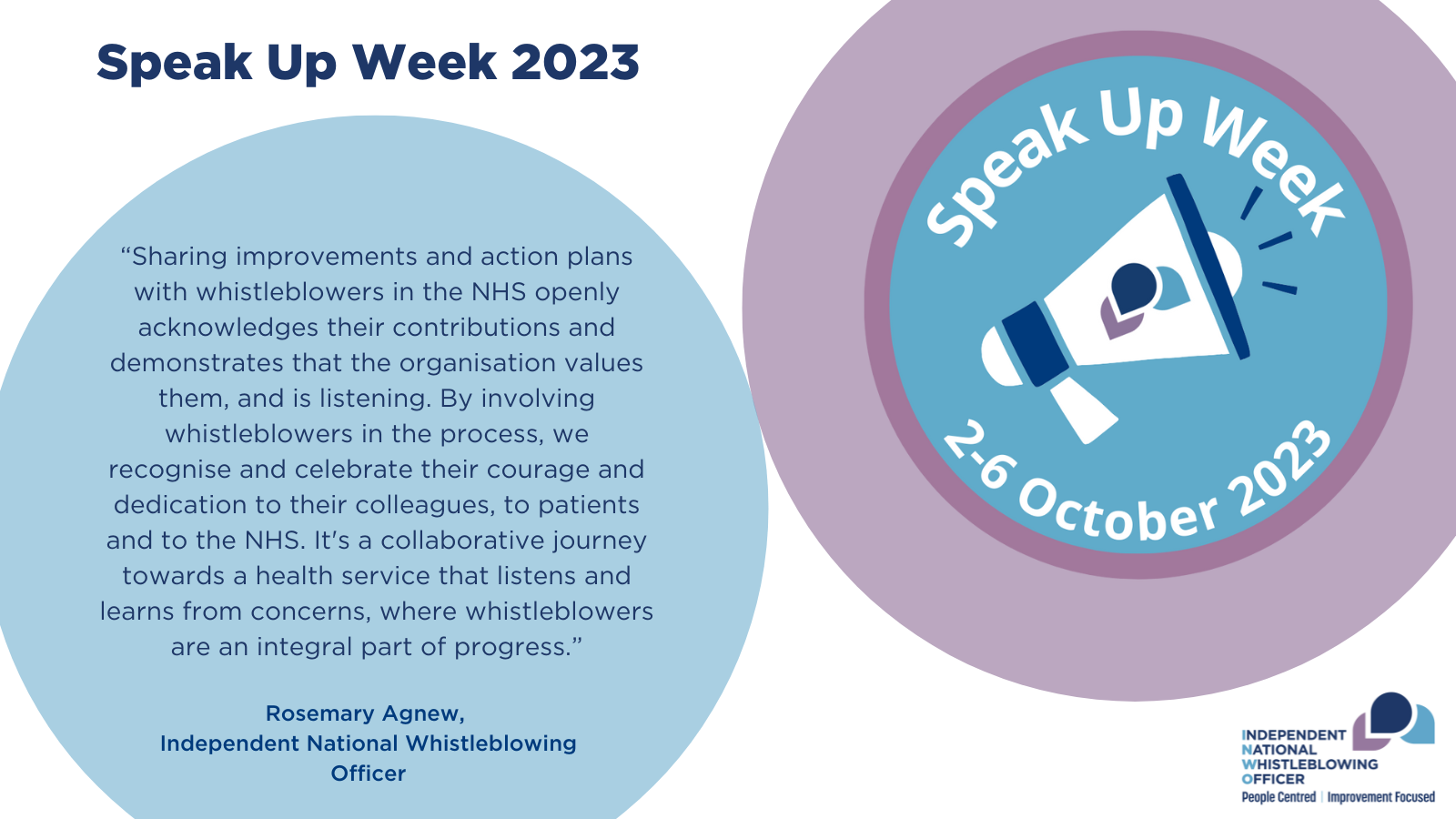
Sharing improvements and action plans with the whistleblower
The final response letter that goes out at the end of the whistleblowing process is an opportunity to demonstrate that concerns have been taken seriously. Today, Amy from the INWO team explains the importance of sharing improvements and actions with the whistleblower.
Live online panel discussion: Learning from concerns
Today we are hosting a live online panel discussion that will cover:
- learning from concerns
- sharing improvements and action plans with the whistleblower
- what a good speak up culture looks like
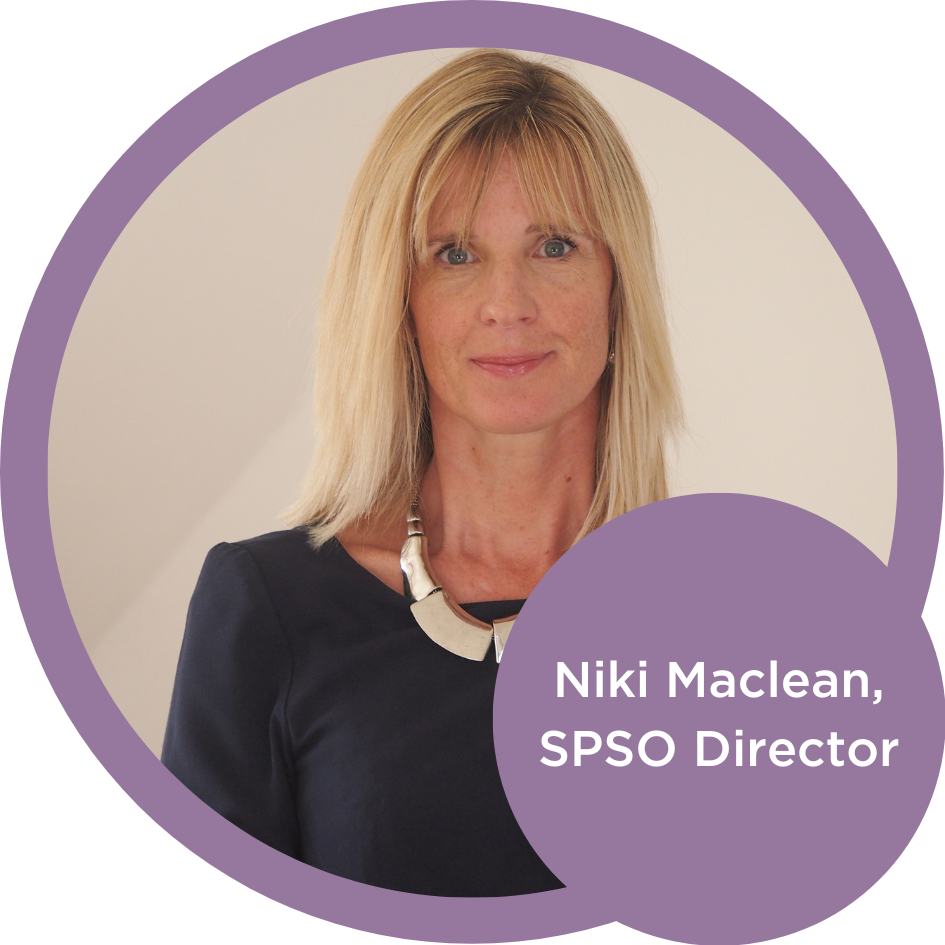
The live discussion will be hosted by Niki Maclean, Director of the SPSO. On the panel will be:
- the Whistleblowing Champion from NHS Fife
- a General Practitioner from the NHS Tayside area, and
- the Chief Executive of NHS Orkney.
The panel members bring together considerable experience and expertise across a number of different fields. We look forward to hearing different perspectives from within and outside the NHS on learning from concerns and sharing improvements.
Registration for this event is now closed but we will be sharing a recording for anyone who was unable to attend. Check back here later or sign up to our e-bulletin for the latest INWO updates.
Wednesday 4 October - Recording outcomes and learning
Wednesday 4 October - Recording outcomes and learning
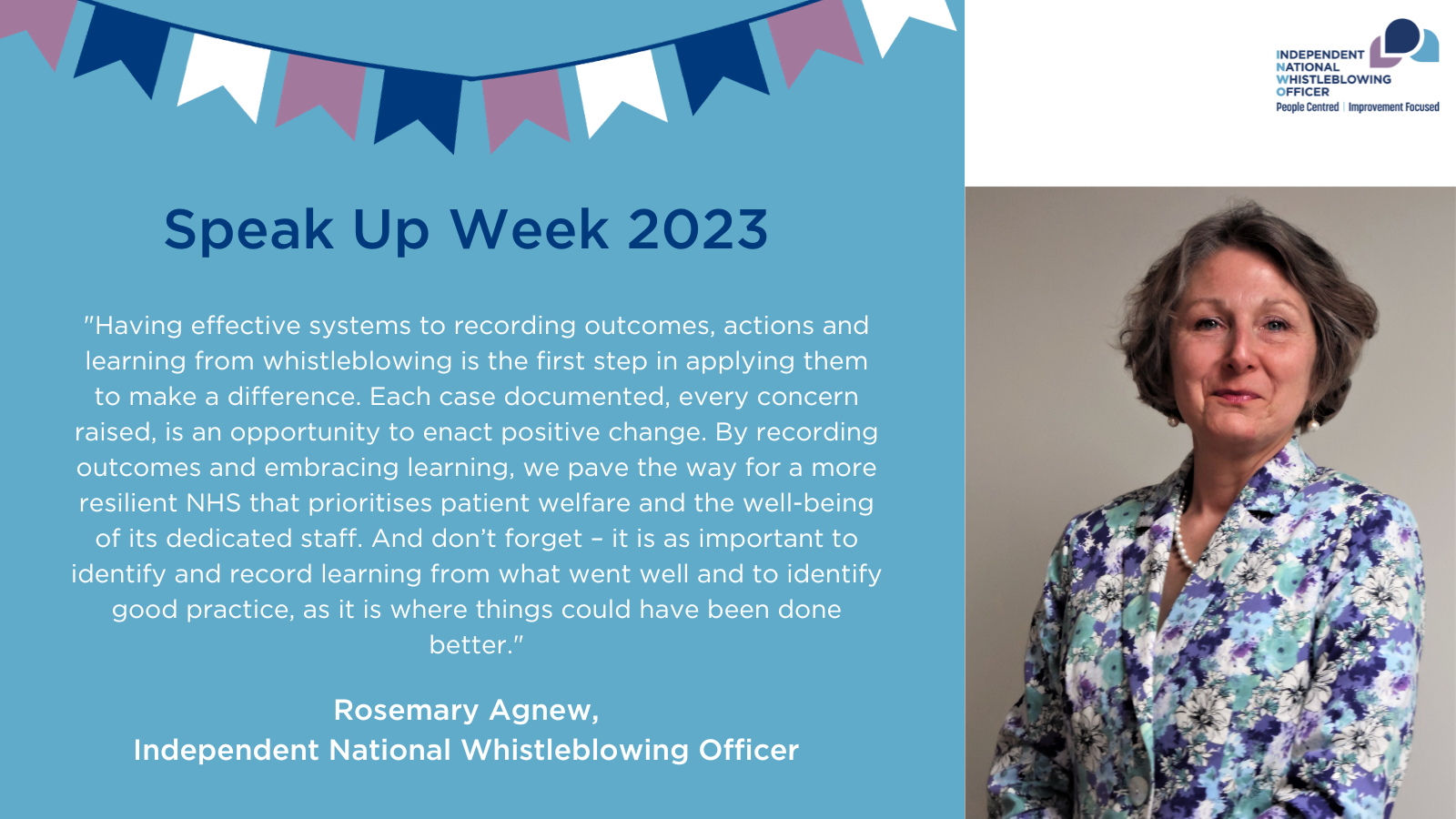
Recording outcomes and learning
Fran from the INWO team explains the importance of recording outcomes and learning as part of developing a good speak up culture and learning from concerns.
Tuesday 3 October - Sharing learning whilst maintaining confidentiality
Tuesday 3 October - Sharing learning whilst maintaining confidentiality
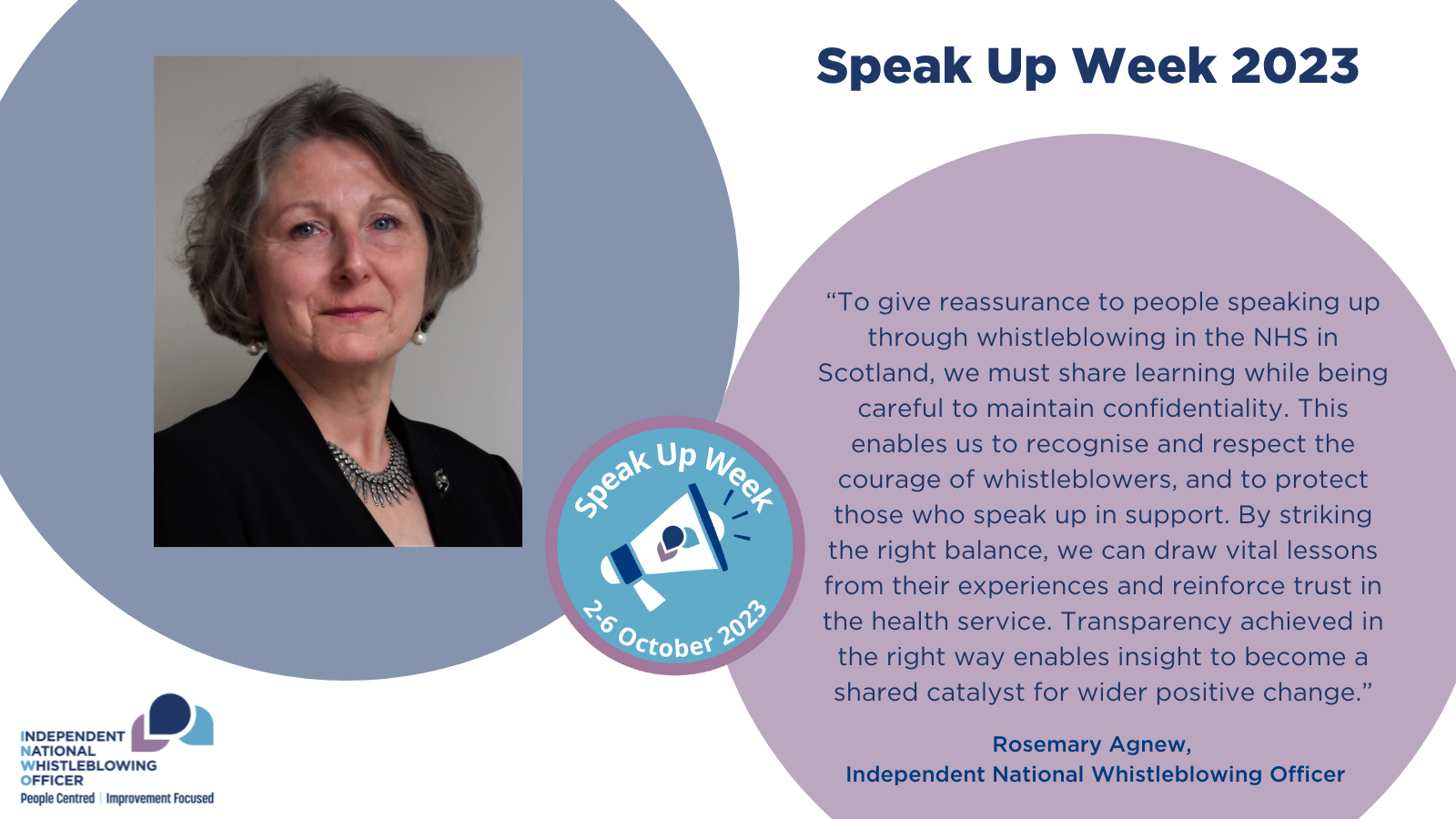
Sharing learning whilst maintaining confidentiality
Ensuring we learn from concerns is one of the main principles of the National Whistleblowing Standards. Edward from the INWO team explains the importance of sharing this learning whilst also maintaining confidentiality.
Blog: The benefits of sharing learning whilst maintaining confidentiality?
Everyone benefits from sharing learning - patients, staff, the organisation, and the public - and those benefits are powerful. Improved efficiency, increased employee satisfaction, more innovation, better services for patients and achievement of objectives.
The challenge is to promote a learning from concerns ethos so that you can reap the benefits. Concerns about confidentiality shouldn’t be a barrier to sharing learning.
Shift the focus when thinking about sharing learning
When a whistleblowing concern is raised and during an investigation, the focus is on minimising the amount of people who know about the concern and protecting the identity of the whistleblower. However, when the investigation is over, its time to shift the focus. The identify of the whistleblower and crucially everybody involved in the concern still needs to be protected, but the new focus is on sharing the learning as widely as possible. The whistleblower and the specific details of their concern are no longer the focus.
Involve other people in your learning
Once you’ve figured out what learning you’ll focus on, you should think about who should be involved. It’s up to you to involve who you think is best. But you may want to think about involving the whistleblower, witnesses, and staff responsible for overseeing the learning and improvements. NHS Boards are encouraged to use action plans to record and monitor improvements and provide a basis against which to report progress and share learning.
What information to share
While it is helpful to provide as much information as possible, this should not be at the expense of confidentiality. Think about the audience. When you are sharing with a wider audience, there may be no need to provide information about a specific department, hospital, staff roles or the medical specialism, dates should be redacted as should reference numbers. Provide information which celebrates the learning and improvements, tell people about how risk has been reduced or that a new process has resulted in positive patient experiences.
Address barriers
If confidentiality is perceived to be a barrier to sharing learning, address this by exploring this topic within your organisation, adjust the level of detail shared and put systems in place to support.
Ways to share
Make learning from concerns a priority. Create opportunities to share learning from concerns, be creative. Consider events like lunch and learns with senior leaders, after action plan reviews, and don’t forget about the annual speak up week.
Take away
Sharing learning whilst maintain confidentiality is achievable and will bring powerful benefits to your organisation.
Monday 2 October - Encouraging a speak up culture
Monday 2 October - Encouraging a speak up culture
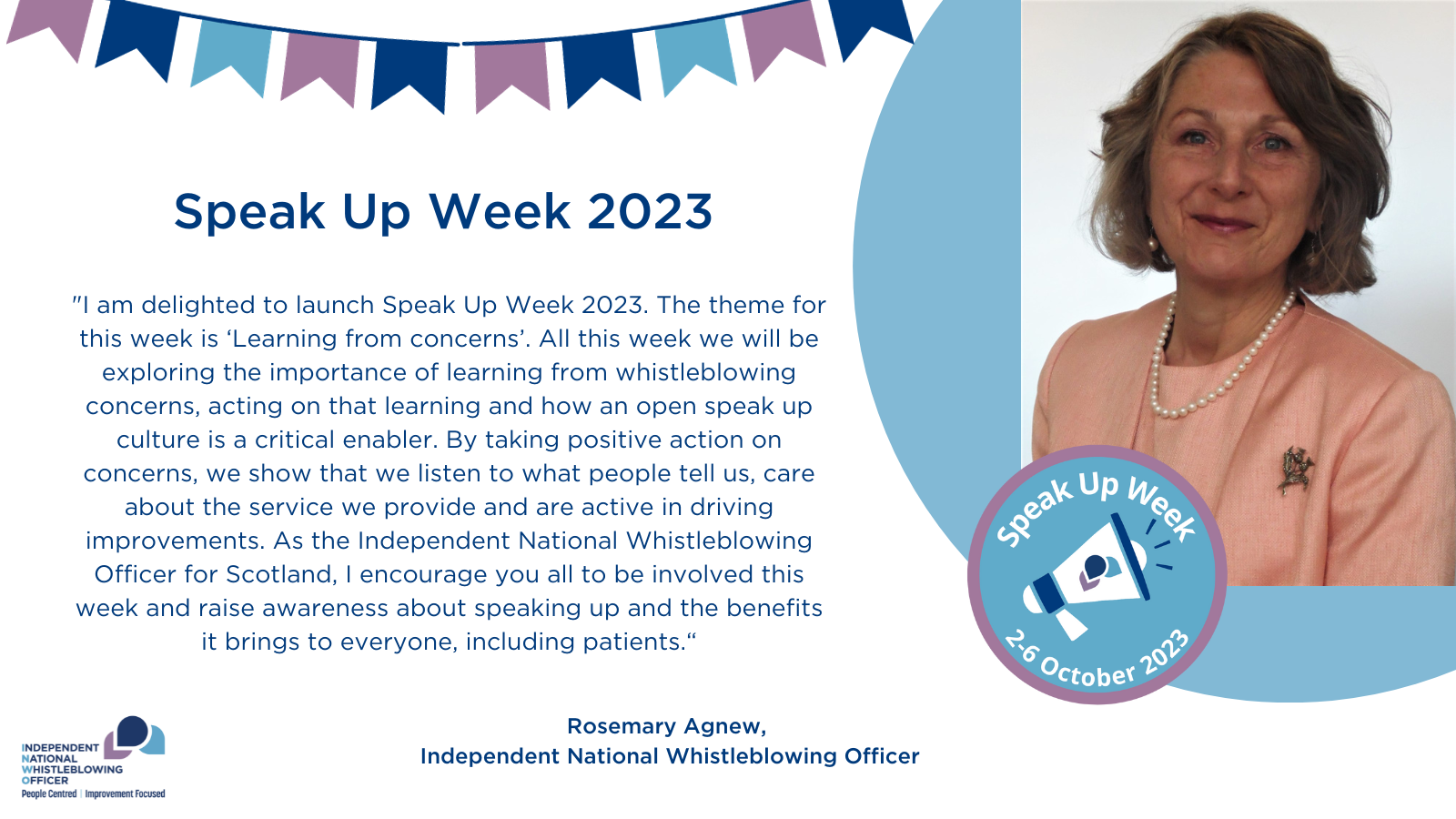
Welcome to Speak Up Week 2023
What makes a good speak up culture in the workplace? Mike from the INWO kicks off Speak Up Week 2023 with some key points.
Interview with the INWO: Encouraging a good speak up culture
Rosemary Agnew, the Independent National Whistleblowing Officer, is joined by Tracey Gillies, the Executive Medical Director in NHS Lothian, to discuss the INWO, whistleblowing in the NHS in Scotland and how to encourage a good speak up culture.
Please note: There is a short blip in the audio around the 9-minute mark.
Resources for your organisation
- Speak Up Week logo (PNG, 118KB)
- Speak Up Week Twitter header (PNG, 80KB)
- MS Teams background 1 (PNG, 108KB)
- MS Teams background 2 (PNG, 115KB)
- Take part in Speak Up Week editable poster (Word, 359KB)
- Tips on how to organise a successful Speak Up Week (PDF, 269KB)
- Social Media suggested posts (Word, 133KB)
- Social Media suggested graphic (PNG, 47KB)
We also held an online webinar on 24 August 2023 to hear thoughts on the theme and share ideas about how to run the week. You can watch back the recording here: